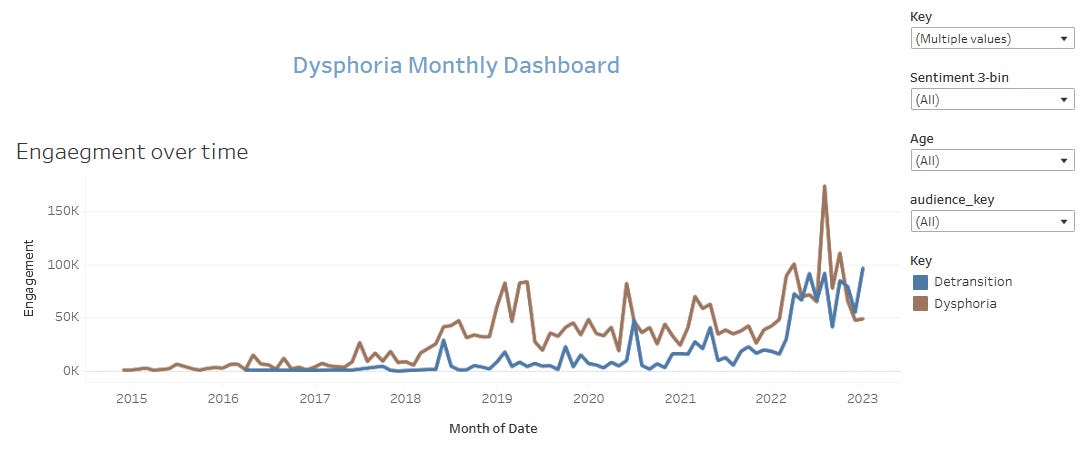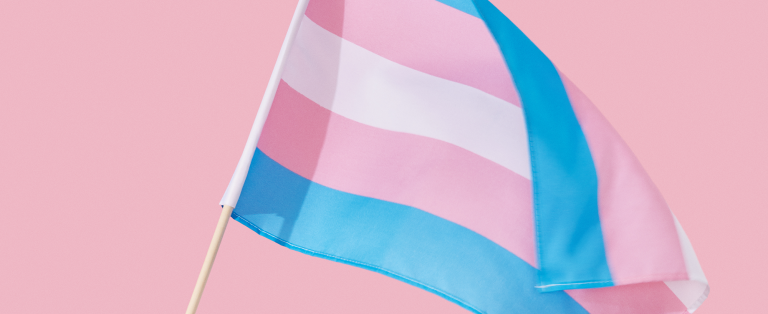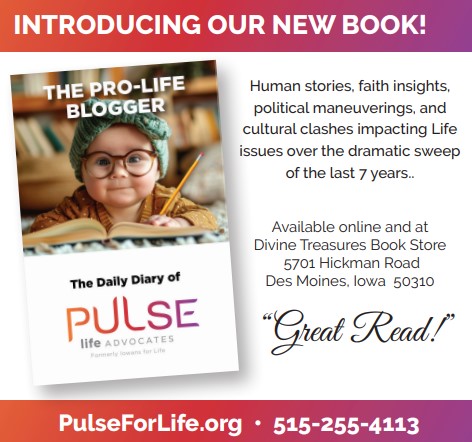From the PITT Substack:
Late last summer I wrote a piece for PITT called Opening the Black Box of Online Influence and the Social Contagion of Transgenderism about an exciting project that we were about to launch – using a custom-trained Artificial Intelligence to survey online spaces to see if we could understand the mechanism of social contagion in places like Twitter, Reddit and Tumblr and of course TikTok.
The project, advised by Dr. Lisa Littman, who coined the descriptive term Rapid Onset Gender Dysphoria (ROGD); Lisa Marchiano MCSW, co-founder of G.E.T.A. who has been writing about the social contagion of Gender Dysphoria since 2016 (Quillette); Jane Wheeler, founder of Rethink Identity Medicine Ethics (ReIME); Mia Ashton, writer for The Post Millennial, Aaron Kimberly, Aaron Terrell, founders of Gender Dysphoria Alliance, and several others is well underway and today I proudly share a first public look at some specific insights.
The interest from PITT readers in August, many of whom are like me, the parents of children swept up into this, was overwhelming and was the last convincer I needed to launch our fundraising efforts and drive the project forward. In August I incorporated a Canadian Non-Profit Foundation called APISC Digital Research (Adolescent Peer Influence and Social Contagion) and we set the wheels in motion to establish our first four audience samples: US & Canadian Twitter, and US and Canadian Reddit.
You can learn about the birth of the project and about our A.I. on the APISC Digital Substack. In this short piece I’m going to share some important insights from our A.I., who we have named Meili (My-Lee), after the Norse god of travelers, about what’s happening with Detransition Awareness online, and we’re going to look at a few indicators that might help us argue more fulsomely for the Social Contagion theory. I’ll also share a few ways that you can support the project if you think this is important work.
The good news about the Detransition conversation online (blue line below) is that the drive to raise awareness by organizations like Genspect, and the powerful testimony of brave detransitioners is sticking in the public mind and imagination, especially since March last year when the topic trended on Twitter around International Detrans Awareness Day. Compared to the brown (general dysphoria topic), we see it is now almost as prevalent on US twitter as the conversation about trans in general.

This is part of the dashboard of our FIRST full report from Meili showing only two topic inquiries: Dysphoria & related conversation clusters, and Detranstion and related topic clusters. Meili is a traveler in digital space and our advisors and financial supporters have often heard me say that there is a difference between a tourist and a traveler; the tourist goes to a new place to see what they want to see, but a traveler goes to see what is there. We named Meili as a reflection of our goal of objectivity, (I compare Meili and Chat GPT in this article here). We want to see what’s there impartially, and we hope that Meili can help us all understand what’s happening to our children and loved ones.
There is a tremendous amount of information we can derive from this chart and boiling down the data into a reliable story has proven so far to be one of the most difficult tasks with this project. We have lots of AI data, and Meili uses a tremendous amount of machine power, but we are also relying heavily on human intelligence and effort, so let’s zoom in:

I show the comparison to the overall Gender/Trans/Dysphoria topic on this graph as a benchmark so we can compare the Trans Conversation (brown) to the Detrans Conversation (blue). It’s important to note that right now, Meili shows us the TOTAL conversation including engagements that are FOR and AGAINST these issues. It’s a measure of the prevalence of this issue in the public mind, and not an indication of the prevalence of trans people or those who have detransitioned. We are working on programming Meili to understand these things better as we go. Efforts to train and deploy Meili to recognize trans-identified users are already underway and we expect results April 15th.
We can look though at what is driving the awareness of these issues and who is driving them as well. In June of 2018, an article came out in The Atlantic in response to a controversial piece the year before by Jesse Singal. This piece was by a person who began transition, stopped, and then went ahead with their transition when they were more prepared, arguing that detransitioners reversed course because of lack of social acceptance.
We see a spike in October 2019 with a controversial report from Sky News that month, the spike in the graph also conveys the backlash to these revealing media stories.
Forward to the summer of the pandemic and George Floyd, with the release of JK Rowling’s famous blog post and the books, “End of Gender” (Debrah Soh) and “Irreversible Damage”(Abigail Shrier). A year later we see the spike in the late summer of 2021 with the promotion and release of Helen Joyce’s “Trans.”
After each of these spikes, the conversation dropped to almost nothing again but early last year in March 2023, with friend of the Meili Project, Dr. Lisa Littman’s publication of her Detransitioner’s study, the release of the interim Cass Review, the organized efforts of notable voices like Genspect and the coordinated bravery of a group of detransitioners, we see that the issue has stuck in the public consciousness.
I feel like it’s important to share a top ten list of the most influential organizations and people on this topic because we have just observed International Detransition Awareness Day again, March 12, 2023. The list here is specific to US influence only and some notable voices in the UK aren’t in the top ten but not for lack of global impact. We can see that just these ten influencers are responsible for more than one of every twenty engagements on Twitter about detransition.

We all know anecdotally that detransitioners face a tremendous amount of abuse and face attempts at discrediting by activists and that it’s extremely difficult for them to speak out. An example close to the Meili Project was the mobbing of Helena Kershner in April 2022 by one of the most influential trans activists online – and this brings me to a crux of Meili’s insights here: he tells us that the top fifteen influencers on Twitter are trans activists. These, sometimes brutal bullies, are putting out four engagements attacking and undermining detransitioners for every one engagement we have in support of this group.
The conversation as we all know is shifting fast. In June of last year I published The Gender Bubble: How Exploding Numbers of Trans-Identified kids looks like a Stock-Market Bubble on my personal Substack, which I have reposted on the new APISC Digital Research Substack. A few weeks after I published my predictions, we saw a major editorial shift in media in Canada with our National Post editorial board warning hospitals to slow down on Gender-Affirming Care. In December Reuters was the first to publish critically about secret social transition of children in schools, followed quickly by National Post, the New York Times and Washington Post. Legislative season in the US, and a recent feature by Dr. Phil, has brought this conversation even more into the public mind.

If you find this insightful, please consider supporting our project through Give-Send-GO and join our mailing list by subscribing to our Substack. We have so much more to share about Meili’s travels in 2023. Are We Closer to the Proof of Social Contagion? Who is Meili, the Digital Traveler Exploring Trans Culture online? Meili’s 2023 Travel Plans and Feb 2023 Update on Progress. I also plan to use this platform to do monthly public information session on our project via Zoom and you can get access by becoming a Patron-Level donor (Learn More).
We are just getting started. Last year, a handful of generous (anonymous) individual donors, and a few organizations who all deserve a special thanks, got us off the ground and we raised almost $40,000 between August and December. Our goal is to raise $120,000 this year to expand the scope to include Tumblr and TikTok.
In the short term we are looking for an individual or group who can help us with $12,500 US to fund Meili’s Expedition into Tumblr with the custom coding it will take to equip his journey. It will take a second gift (or several smaller gifts) of that scope to deploy into TikTok.
If that seems out of reach for you, consider giving $25, $50 or $100 a month. Having 100 Patron-Level donors contribute $100 per month, via our Give-Send-Go campaign, means we reach our funding goal with small commitments from lots of people.
I am personally funding the operational costs of the non-profit and contributed about $3,000 to the launch last year and plan another $2,000 this year. Up until now, all support for the project has been volunteer and all 100% of funds from direct donors through Give-Send-Go will go directly to computing and coding costs for at least a year. A successful fundraising campaign more than our goal will help us work with a PR/GR firm that will aid us in messaging to the public, to the media and to politicians in the US and Canada.
Help us get the data to burst the gender bubble.
















